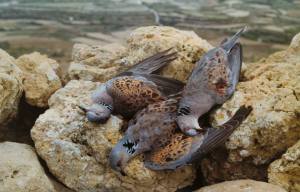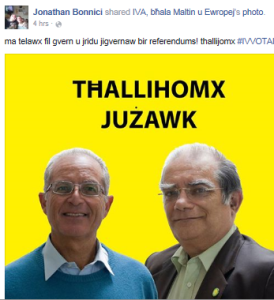Issa għaddew iktar minn seba’ snin minn meta issejjaħ ir-referendum dwar il-kaċċa fir-rebbiegħa. Referendum li kien inizjattiva ta’ Alternattiva Demokratika flimkien ma’ koalizzjoni ta’ 13-il għaqda ambjentali u tal-ħarsien tal-annimali u li kien intilef b’numru żgħir ħafna ta’ voti. Kultant dan il-proċess demokratiku jerġa’ jissemma’ fl-aħbarijiet u dan billi l-għaqdiet tal-kaċċaturi jridu jnaqqsu l-aċċess għal dan id-dritt. S’issa, fortunatement, ħadd ma jidher li ta każ tagħhom. Imma ħadd ma jaf jekk l-affarijiet jinbidlux fil-futur!
Flok ma nirrestrinġu l-użu demokratiku tal-għodda tar-referendum għandna nikkunsidraw li nestendu l-użu tiegħu. Sal-lum għandna d-dritt li niġbru l-firem biex jissejjaħ referendum li jipproponi li titħassar liġi jew parti minnha. Għalhekk jissejjaħ referendum “abrogattiv” għax huwa referendum li jħassar ligi jew parti tagħha. Dan id-dritt demokratiku għandu jkun estiż biex ikun possibli li jittieħdu inizjattivi dwar liġijiet li l-Parlament jevita b’mod kontinwu. ADPD-The Green Party repetutament ippropona li dan isir bi proposti speċifiċi fil-manifest elettorali. L-aħħar darba li dan sar kien fl- elezzjoni ġenerali tal-2022.
Ir-referendum tal-2015 dwar il-kaċċa fir-rebbiegħa kien biex jitħassru regolamenti li kienu jippermettu l-kaċċa fir-rebbiegħa. B’dan il-pass kienet tkun qed tiġi imħarsa l-bijodiversità u dan għax fil-perjodu li l-għasafar ibejtu l-ebda kaċċa ma kienet tkun permessa. Dan imma ma kienx jindirizza l-ħarsien tal-għasafar b’mod iktar wiesa’. Biex dan ikun jista’ jseħħ teħtieġ li tkun abolita l-kaċċa f’kull żmien. Din fil-fatt kienet, u nifhem li għada, l-posizzjoni ġustifikata tal-għaqdiet li jaħdmu favur l-annimali.
Id-dibattitu lokali dwar il-ħarsien tal-annimali hu sfortunatament limitat għall-annimali li nżommu fid-djar (pets), dawk li jintużaw fir-riċerka, kif ukoll riċentment għaż-żmiemel li jintużaw mal-karozzini. Ittieħdu diversi inizjattivi dwar iż-żwiemel u dan wara ħidma bla waqfien mill-għaqidet li jaħdmu favur il-ħarsien tal-annimali.
Il-mod kif l-industrja tal-agrikultura timxi mal-annimali fl-irziezet hi materja ta’ importanza. Qed jingħata importanza dejjem ikbar fl-Unjoni Ewropeja.
Riċentement, Alison Bezzina, il-Kummissarju għall-Ħarsien tal-Annimali ippruvat testendi d-diskussjoni dwar dan kollu billi ikkummentat dwar il-konsum tal-ħalib. Il-kummenti tagħha saru fil-Jum Dinji tal-Ħalib (3 ta’ Ġunju). Hi ibbażat il-kummenti tagħha fuq dak li jgħaddu minnu l-baqar li jipproduċu l-ħalib b’mod naturali għall-għoġġiela tagħhom u jispiċċaw jeħdulhom kemm il-ħalib kif ukoll lill-għoġġiela biex jinbiegħ kummerċjalment!
L-argument dwar il-mod kif nimxu mal-annimali jkompli. Intqal illi kieku l-biċċerija għandha ħitan tal-ħġieg, ħadd iktar ma jiekol laħam. Il-punt hu li l-mod kif jiġi prodott il-laħam jassoġġetta lill-annimali għall-moħrija esaġerata li, kieku tkun magħrufa, tant taħsad nies li kważi ħadd iktar ma jmiss il-laħam b’mod permanenti.
It-trasparenza fil-biċċerija u l-fabbriki tal-annimali hi essenzjali biex ikun assigurat li r-regoli bażiċi li jħarsu lill-annimali mill-moħqrija bla sens qed jiġu osservati.
It-triq mir-razzett sal-mejda tal-ikel hi mimlija bi problemi konnessi mat-trattament ħażin tal-annimali. Li kellna nkunu nafu iktar dak li jseħħ wara l-bibien magħluqin tal-irżieżet jew tal-fabbriki tal-annimali bla dubju jkollna nibdew naħsbu sewwa dwar l-għażliet tagħna ta’ dak li nieklu. Dawn huma għażliet li ħafna drabi nagħmluhom b’għajnejna magħluqa, bla ħafna ħsieb. Huma għażliet awtomatiċi li ħafna drabi ftit tajna każ ta’ xi jfissru: għax dejjem hekk għamilna.
L-etika dwar dak li nieklu hi estensjoni naturali tad-dibattitu ambjentali. Fil-fatt il-ġustizzja ambjentali u l-ħarsien tal-annimali huma tewmin.
In-numru ta’ dawk li ma jieklux laħam qiegħed jiżdied kif qiegħed jiżdied in-numru ta’ dawk li ma jridux imissu prodotti ġejjin mill-ħalib. Din iż-żieda hi waħda fuq livell globali. Dawn l-għażliet qed isiru fuq konsiderazzjonijiet ambjentali, konsiderazzjonijiet dwar ħarsien tal-annimali kif ukoll konsiderazzjonijiet etiċi.
Il-Gvern jippenalizza lil dawk li jagħmlu għazliet etiċi dwar l-ikel. Dan ġie emfasizzat riċentement waqt intervista ta’ Darryl Grima, ambjentalist, veġan u attivist kontra l-qtil tal-annimali għall-ikel. Hu meħtieġ li l-Gvern ma jibqax jippenalizza lil min jagħmel dawn l-għażliet. Darryl Grima jsemmi eżempju wieħed. Il-ħalib hu meqjus bħala prodott tal-ikel u għaldaqstant fuqu ma titħallasx taxxa fuq il-valur miżjud (VAT). Imma l-prodotti li jintużaw bħala alternattivi għall-ħalib ma jitqiesux bħala ikel u allura huma soġġetti għall-VAT. Dan mhux sewwa u għandu jinbidel.
Mahatma Gandhi kien jemfasizza li “l-kobor ta’ nazzjon u l-progress morali tiegħu jitkejjel minn kif huwa jittratta lill-annimali.” Dan jgħodd għal kulħadd, f’kull żmien.
ippubblikat fuq Illum : 10 ta’ Lulju 2022









